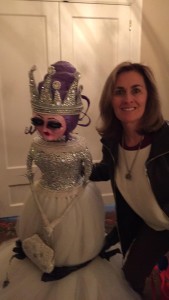"Scientists have discovered a revolutionary new treatment that makes you live longer. It enhances your…

Can the MBTI Help You in Very Practical Ways?
Can knowledge about your personality type (best known by the MBTI™) help you leverage who you are? Is it a decent road map? This is the way I look at it:
I have been studying personality type since 2008 but there was many more years where I didn’t know anything about type. I am 53 now so that means I spent nearly 7 times as many years without these insights. What might have I done differently had I known about this?
My type is ENFP which is commonly associated with these descriptors: Energetic, Visionary, Imaginative, Spontaneous, Gregarious, Insightful, Casual, Idealistic, Sensitive, Collaborative. The ENFP is a bit of a playful free spirit who is highly optimistic but also quite a bit more serious than what you may encounter at first glance. There is a tendency to flex into a situation but with it a corresponding difficulty knowing what is truly an optimal choice.
Type is more than just a set of descriptors. It is a developmental model for self-improvement. This is where I could have really used the knowledge for the other 75% of my life.
- I would have chosen different classes when I started college. My first semester consisted of French, Chemistry, Math for Scientists, and a writing class. Now, type doesn’t equate to skills but it may shed light as to why I wasn’t terribly engaged in these classes and had a shaky first semester GPA. Here’s some gory details: I had to convince the math instructor to let me write a term paper to get me out of there with a C, my version of desperate adaptability. I also threw my chemistry book out the 3rd floor window after failing a test and went out for a few grapefruit juice and vodkas instead. Could I really be that under-qualified or flat out stupid? Of course not! I wasn’t matching my cognitive gifts to my choices. Type most certainly could have helped me choose other classes or at least help me with a different approach.
- There were a couple of teachers in my early schooling who were undoubtedly my type opposite. Sister Sarah Jane was gunning for me the moment she saw me and even told my dad my brother’s conference the year before that I was “a bad one.” Had I known about type, I would’ve understood that she saw the world differently than me (lots of order!) and that it wasn’t a good/bad question. Sister Agnes Joseph Sun- another tough one. She was about as engaging as a dead fish (in my eyes). In hindsight, she probably had a preference for introversion and sensing (spend lots of time thinking before speaking then proceeds sequentially) whereas I had to jump right into the mix or my thoughts were gone! She also predicted that I had no future. I was angry and crushed.
- Type would have helped me understand time management. Those who prefer perceiving, particularly ExNP’s really do prefer to follow the energy in the moment. That’s what makes them adaptable, optimistic, and improvisational. At the same time, the attraction to the emerging moment can have real consequences for getting somewhere on time and making a lot of people mad. I can’t tell how many times I was told I was rude for being late when that was never my intention. I was the same person who would also be late for the next thing so I could spend a little extra time leaving the last scene at a higher peak of positive energy. A little type knowledge would have helped me nuance those 2 poles.
- Type would have helped me understand how I could feel alone in a crowd. ENFP types are drawn toward concepts and emerging connections. Not all of life is about these types of discussions though. What is being noticed and discussed is different depending on the occasion. When you’re an individual who usually has a lot to say but doesn’t have much to say in certain settings, it’s easy to feel left out. Or at least feel awkward because you feel you should be able to say something. It certainly would have helped me to appreciate those other discussions.
- To that end, I was attracted to a wide variety of people, often many who were off-beat. Social hierarchies and groups with protocols were a real challenge. I was briefly in a sorority and I started to mention something about the initiation ritual to someone outside of the circle. I was immediately upbraided for disclosing any information about it because it truly was secret! I struggled trying to understand rules in general. I didn’t want to control anyone or be controlled. Insight would have helped me understand why and also flex into necessary protocols with a little less resistance.
- ENFPs are dominant extraverted intuitives. This function is our king and it drives us. That means ideas, connections, and transcontextual thinking is like a 220v socket for our souls. Dario Nardi who researches brain mapping and type describes the dominant extraverted intuitive as a lit-up, flashing, Christmas tree brain. Partially the descriptor refers to the colored EEG patterns and part of it refers to the multiple areas of the brain that are fired up at once. In fact, it has been suggested that if you want to experience this type of thinking, have a cocktail. A Christmas tree brain archetype would be an improv specialist or someone like Robin Williams. It is positively exhilarating for me to be in that space sans cocktail and it is perhaps my favorite part of being this personality type. Just about everything is fun! Type knowledge would have helped me honor and appreciate this part of me instead of thinking I was truly crazy. At the same time, knowing when to turn off the firehose of ideas and suggestions would have served me well also.
- ENFPs are not just about ideas, riffing, curiosity and fun. There is a deep longing to understand the world, particularly people, and how to serve them or bring joy and meaning into their lives. Driving this is a set of internal values that help ENFPs decide whether something is unacceptable, acceptable, good, great or awesome. Flexibility comes into play here because sometimes it is the enemy of the discovering the optimal. Extraverted intuition can make the case for any eventuality being acceptable and there is a natural attraction toward the challenge of making lemonade out of lemons. A strong sense of underlying principles to sort options is key. Oftentimes ENFP types will say yes in the moment because the possibilities are energizing only to ask themselves, “Why did I commit to that?'” later. Hence I would have had no vitamin selling career if I had known to check in with myself!
So can this psychological type assessment help you out in very practical ways? Unequivocally yes. If you know yourself, then you can work on personal development without harsh judgment. And you spend a heck of a lot less time judging others too. What are a few things that may have been different in your life had you known about personality type?




This Post Has 0 Comments